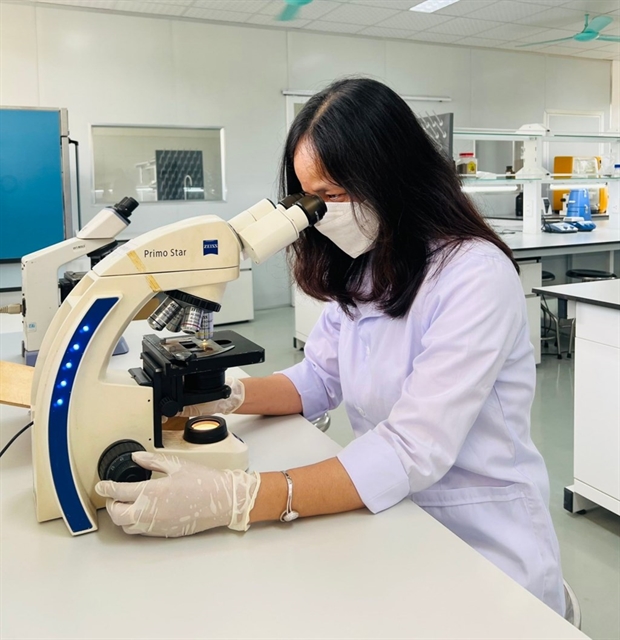.jfif) Opinion
Opinion


|
| Assoc. Prof. Dr. Nguyễn Thị Minh |
Assoc. Prof. Dr. Nguyễn Thị Minh, manager of the "Application of outstanding technologies to support farmers develop agri-aquaculture” programme, founder of the Spin-off bioagricultural JAMITECH-VNUA pilot programme and founder of the subject of Microbiology at Việt Nam Academy of Agriculture’s Natural Resources department talks to Vietnam News Agency about the academy’s scientific and technological research findings.
The Việt Nam Academy of Agriculture is the cradle of research into scientific and technological products widely applied in agricultural development in Việt Nam. Which outstanding scientific and technological products have helped farmers increase productivity?
A typical example of a set of products that has been recognised and tested for outstanding effectiveness in agriculture and aquaculture is Vnua-Mios V, which has been patented by Vnua-Aqua and approved for distribution by the Ministry of Agriculture and Rural Development‘s Department of Livestock Production.
Vnua-Mios V is a group of multi-functional microorganisms. They contain probiotics that enhance livestock’s digestive and immunity systems, thereby reducing the amount of feed required as well as waste emissions.
The product also has the ability to ferment and anabolise decomposers, therefore, it is able to effectively eliminate odours caused by waste. Its enzyme activity breaks down and converts organic substances in the waste into easily digestible nutrients, which makes effective use of waste as raw materials to produce organic fertiliser for plants. In addition, Vnua-Mios V has the ability to limit disease outbreaks by breaking down pathogens.
Thanks to these benefits, our probiotics have been widely implemented in closed loop agriculture and aquaculture farming practices. They help keep animals healthy, limit and prevent disease outbreaks, and reduce waste and pollution. In turn, the reduced waste emissions from our research ensures the biosafety of livestock entirely without the use of chemicals and antibiotics.
As a result, yield from livestock has increased significantly, and the quality of animal products such as meat, eggs, milk, has improved to meet safety standards as well as consumers’ demand for clean agricultural products.
Thus, the use of our probiotics will increase the value of animal husbandry as a sector, contributing to the development of green and circular organic agriculture, moving the sector in line with the Government’s orientation for the future of farming, as well as aligning the industry with the standards required for international integration.
Can you be more specific about the economic benefits that farmers reap by utilising technology developed by the Việt Nam Academy of Agriculture?
When implemented throughout the entire production cycle, the Việt Nam Academy of Agriculture’s microbial products will aid and improve digestion and immunity in animals, which will reduce the amount of feed required without compromising their health and growth, all the while decreasing the volume of waste produced. Not only can the usage of probiotics cut down the amount of feed needed by approximately 20 per cent, but it can also completely replace commonly used chemicals and antibiotics in animal rearing.
On average, input costs will be reduced by VNĐ200,000-300,000 per pig and VNĐ20,000 per chicken. In addition, the product also minimises environmental pollution without affecting farmers' health; thus, acquiring approval from civilians around the farming region will not be a challenge. Since the need for – and subsequently traces of – antibiotics for disease prevention in farming will be eliminated, and livestock waste will be used to produce organic fertilisers for crops, the quality of products such as meat, eggs, and milk will also increase to meet safety and export regulations. As a result, the value chain will increase for farmers while still protecting the environment.
These technology developments, when implemented properly according to closed loop agriculture and aquaculture protocols, will be an effective force in supporting the development of a circular economy in localities, aiding the development of organic and green agriculture simultaneously.
How does the Việt Nam Academy of Agriculture plan to develop these research products of outstanding value across the country in the future?
We have established a programme called "Application of outstanding technologies to support farmers develop agri-aquaculture” for a three-year period until 2025, when we plan to collaborate with and bring this technology to cities and provinces all across the country. We will provide guidance on designing biologically safe and viable farming procedures, as well as providing in-person technical guidance to farmers, in order to help them implement pilot models of organic production. From then on, these guidance sessions will start a knock-on effect, with farmers replicating and spreading farming practices in surrounding localities. The replication of these production cycles will gradually improve the productivity and quality of agricultural products, ensuring the safety of animal products and consumers’ health for the population.
The programme has been implemented in Hòa Bình and Bến Tre provinces. The programme is scheduled to be deployed to other provinces such as Bắc Giang, Hải Phòng, Hải Dương, Thanh Hóa, and Ninh Bình by the end of 2022. As a result, farmers will be able to directly benefit from the application of scientific and technical advances made by scientists at the Việt Nam Academy of Agriculture.
The Việt Nam National Academy of Agriculture has a policy to support science and technology start-up models, especially the pilot establishment of the Spin-off Science Technology Start-up Enterprise. What is your opinion on this policy?
I believe it is an excellent pioneering policy. The model has broken the barriers between scientists, farmers and businesses, helping to realise the potential of scientific research, and paving the way for successful applications of scientific studies from laboratories into production.
Upcoming products from the lab such as Ja-MiosV, Ja-Biotic, and Ja-Aqua will be put on the market by us through the Spin-off Science and Technology Start-up Enterprise, environmental agricultural biotechnology JAMITECH-VNUA. These outstanding scientific developments will drive scientists to expand their creative capacities in order to research new, increasingly polished and preeminent technologies. This will result in farmers being able to overcome difficulties, earn more money, and establish a green and ecological agri-aquaculture industry. VNS